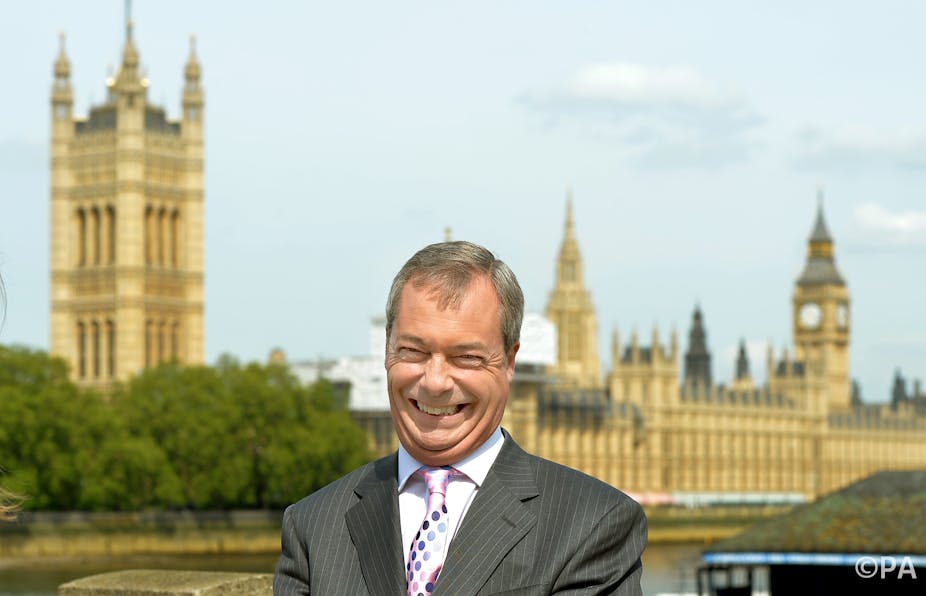The CBI is big business, it is corporatism, it is effectively an arm of government
So said Ukip leader Nigel Farage when interviewed by the BBC on what businesses feel about Europe. Farage may be wilfully mistaken about many things but here he seems to have hit on an inconvenient truth: the recent actions of the CBI demonstrate how our political leaders are in lock step with corporate interests.
The CBI – Confederation of British Industry – is the dominant campaigning and lobbying organisation for UK business. Its stated aim is to “keep business interests at the heart of policy in Westminster”. It prides itself on its “political access and breadth of membership”.
The CBI is a not a model of corporate transparency. Secretive and shadowy, it reveals no details of its members. It claims to “speak for companies of every size” but provides no information about the numbers of different sizes and types of businesses or their spread across the UK. Its AGM is today but it is highly unlikely that questions will be raised about the conduct of its leadership or the effectiveness of its governance.
There is no equivalent mystery about why Nigel Farage has hit out against the CBI. The CBI is broadly pro-EU whereas Ukip wants the UK to withdraw from Europe and is demanding an immediate referendum on the issue. The name calling – the CBI is “corporatist” and so on – must be interpreted in the context of Ukip’s efforts to discredit all those seeking to postpone a referendum pending negotiations.
Farage’s strident appeal is populist. He gleefully knocks anything that annoys the beleaguered “man on the Clapham omnibus” who feels that major political parties are neglectful of his identifications and concerns. Exploiting and fuelling this alienation, Farage presents “big business” as the equivalent of the European Commission. Any institution that curbs individualism by regulating it is self-evidently an “arm of government”. As Farage takes pot shots at the establishment, including the CBI, a frisson of resentful, sadistic pleasure is rewarded by admiration and popular support.

So, is Farage entirely wrong about the CBI? Unfortunately not. To grasp why not, it is necessary to consider another referendum – on Scottish independence. On this issue, the CBI has indeed been acting as an arm of the present government by giving its backing to the no campaign. By failing to ballot its members, or even engage in meaningful consultation with its principal stakeholders, it has been acting like big business. CBI-style “corporatism” is not harnessed to government but, rather, to a pro-Unionist section of its membership. The debacle over Scottish independence should set alarm bells ringing about CBI governance and its leadership of the UK business community.
The CBI eventually conceded it had taken an overtly political stand on Scottish independence when it registered with the Electoral Commission as a no campaign supporter, back in April. Such partisanship flies in the face of many of its members – in both private and public sectors – who have declared their neutrality or support for the yes campaign. Placed in an impossible position, these members staged a mass walk out from the CBI.
Among them was the BBC which, being obliged to maintain its image of neutrality, was “outed” as a member of the CBI and suspended its membership. The revelation the national broadcaster was a member of a pro-business campaigning organisation rightly stoked doubts about BBC impartiality and the justification for using its licence fee to pay the CBI annual membership of tens of thousands of pounds over many years.
Hoping to shrug off these embarrassing revelations, resignations, suspensions and their ramifications, the CBI Director-General has refused to explain how the organisation consulted its members over its support of the no campaign or how its mandate was secured. The CBI also appears to have contravened the Companies Act of 2006 which requires bodies with a Royal Charter to seek authorisation under Section 366 before incurring political expenditures.
In a farcical move to extract itself from a toxic mix of legal morass, membership flight and public relations disaster, the CBI sought to rescind its Electoral Commission registration by using the pretext that its application had not been approved by an authorised signatory, thereby casting further doubt upon the competence and credibility of its leadership.
So, Nigel Farage is at least partially right, but for the wrong reasons. On the Scottish independence issue, the CBI has not hesitated to operate politically as “an arm of government” by supporting the no campaign. In failing to consult, let alone ballot, its members, it has acted like a big business bully. But instead of manipulating populist sentiment by lashing out at the CBI for being pro-EU, critics should target flaws in its governance and the arrogance of its leadership.
In its most recent annual report, corporate governance is described as “what the board of a company does and how it sets the values of the company”. What, then, are the values that can be discerned from the CBI’s handling of the Scottish independence issue? High on the list must be secrecy, impetuousness, cynicism and disregard of its Royal Charter. To these may be added arrogance as, contrary to the UK’s corporate governance code, there is “no formal evaluation process of the Board” whose responsibility it is to decide on issues of governance. Why not? Because as a consequence of “the experience of the President and the CBI board … no formal process is deemed necessary”.
So speaks the self-satisfied “voice of UK businesses”. It is a voice echoed in the complicit smugness of the political classes towards self-serving corporate regulation that is witheringly but indiscriminately attacked by Farage.

